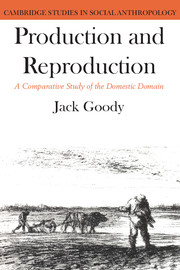Book contents
- Frontmatter
- Contents
- Tables
- Figures
- Preface
- Acknowledgements
- 1 The evolution of the domestic economy: the hoe and the plough
- 2 The theory, the variables and a test
- 3 Making causal inferences
- 4 Farming, labour and sex
- 5 Concubines and co-wives: the structure of roles in Africa and Eurasia
- 6 Adoption in cross-cultural perspective
- 7 Strategies of heirship
- 8 Class and marriage
- 9 Retrospect
- Appendix 1 Tables
- Appendix 2 The probability of family distributions
- Notes
- References
- Index
8 - Class and marriage
Published online by Cambridge University Press: 05 June 2012
- Frontmatter
- Contents
- Tables
- Figures
- Preface
- Acknowledgements
- 1 The evolution of the domestic economy: the hoe and the plough
- 2 The theory, the variables and a test
- 3 Making causal inferences
- 4 Farming, labour and sex
- 5 Concubines and co-wives: the structure of roles in Africa and Eurasia
- 6 Adoption in cross-cultural perspective
- 7 Strategies of heirship
- 8 Class and marriage
- 9 Retrospect
- Appendix 1 Tables
- Appendix 2 The probability of family distributions
- Notes
- References
- Index
Summary
The distribution of variables such as diverging devolution and in-marriage tends to be linked (theoretically and empirically, logically and statistically, I argue) to Africa on the one hand and the major Eurasian civilisations on the other. So too does the distribution of roles such as that of concubine and cowife, of mechanisms such as adoption and of various other strategies of heirship. In this chapter, I examine the way these features are related to types of ‘class’, to modes of social stratification, that once again set Africa apart from the states of Europe and Asia.
A problem about West Africa was raised a hundred years ago by Richard Burton in the description of his mission to Gelele, king of the state of Dahomey. ‘Truly it is said that whilst the poor man in the North is the son of a pauper, the poor man in the Tropics is the son of a prince’ (1864, 40–1). It is a problem that was taken up fifty years later in another form by the Gold Coast lawyer from Cape Coast, John Mensah Sarbah, when he wrote that ‘in the African social system the formation of a pauper class is unknown, nor is there antagonism of class against class’ (Redwar, 1909; vi). And it is a problem that has been central to current controversies between European Marxists on the one hand, and African socialists on the other, about the nature of the systems of stratification in that continent (Grundy, 1964).
- Type
- Chapter
- Information
- Production and ReproductionA Comparative Study of the Domestic Domain, pp. 99 - 114Publisher: Cambridge University PressPrint publication year: 1977

